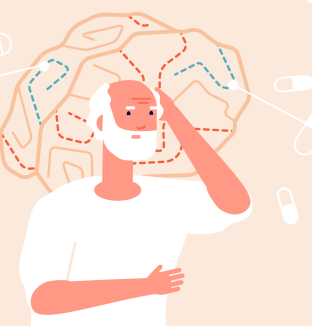A study of the drugs indicated for residents suffering from Alzheimer's disease
Last June, emeis published a study on the link between the use of specific Alzheimer's drugs and mortality among its residents suffering from major neurocognitive impairment due to Alzheimer's disease. Find out more...
What are neurocognitive disorders?
Neurocognitive disorders (NCD) are the slow, progressive decline of cognitive functions, mainly memory, orientation in space and time, attention, judgment and language. A variety of diseases can be responsible, with Alzheimer's disease at the forefront, but also cerebrovascular diseases, Lewy body disease and Parkinson's disease, as well as frontal degeneration. Impairment of these cognitive capacities also leads to loss of autonomy - they are then qualified as major TNC (or dementia), often with behavioral modifications, and are one of the main reasons for entry into retirement homes.
According to the WHO, over 55 million people worldwide suffer from major cognitive impairment, with 10 million new cases each year. The number of people affected could double by 2040. In addition, 60-70% of people with major cognitive impairment or dementia suffer from Alzheimer's disease.

Caring for a person affected by Alzheimer's disease or a related disorder
To date, there is no cure for these neuro-evolutionary diseases. However, it is possible to delay the worsening of symptoms and maintain a certain quality of life through a number of complementary actions: promoting daily physical activity, a balanced diet, as well as numerous social interactions and stimulating cognitive activities.
The fight against cardiovascular risk factors (hypertension, diabetes, smoking, sedentary lifestyle, hyperlipidemia) also helps to prevent certain types of brain damage, thereby limiting the worsening of vascular cognitive disorders, as well as Alzheimer's disease. In addition to the psychosocial therapies mentioned above, certain Alzheimer's disease-specific drugs can have a moderate but significant beneficial effect on cognitive disorders in certain patients:
- cholinesterase inhibitors such as donepezil, galantamine and rivastigmine,
- NMDA receptor antagonists such as memantine.
A large proportion of residents living in retirement homes have a major neurocognitive disorder treated by these Alzheimer's disease-specific drugs, but their effect is poorly understood in this population. emeis set out to study the effect of these drugs on mortality among its residents in France.

A study of data from all retirement homes
The study, published in 2024, involved 25,358 residents with major neurocognitive disorders admitted to 229 French retirement homes since January 1, 2014, based on anonymized data: age, gender, level of dependency, index of comorbidity(ies), Mini Mental Status Examination (MMSE) score on admission and their exposure to Alzheimer's disease-specific medications.
This study reveals that the use of Alzheimer's disease-specific drugs in residents with major neurocognitive impairment due to Alzheimer's disease is associated with lower mortality, irrespective of age, sex and associated diseases. All four molecules showed a positive effect on life expectancy. No large-scale study of this type had previously documented such a link, which justifies its publication in a major international journal.
By advancing research, emeis contributes to the collective intelligence that the medical world needs to face tomorrow's challenges.

